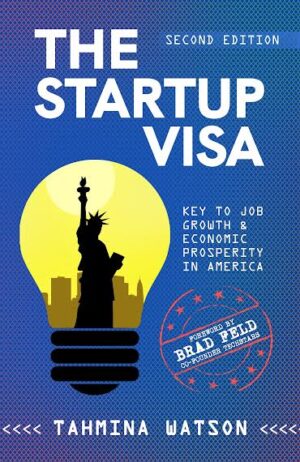 When I started my firm in 2009, I had no idea that 12 years later I’d have two books behind me and would be obsessed with changing law and policies.
When I started my firm in 2009, I had no idea that 12 years later I’d have two books behind me and would be obsessed with changing law and policies.
As an immigrant, an immigration lawyer, and an entrepreneur, I get to see up close the incredible contributions my clients make to this country every day. They’re creating jobs. They’re innovating. They are making a difference.
During the 2008 recession, when many employers were laying people off, I had many clients and had met many international entrepreneurs who wanted to start their businesses in this country — but couldn’t. They couldn’t because a suitable visa for startup founders didn’t exist. And it still doesn’t.

Why Law Firms Are Moving Beyond The Billable Hour
Explore 5 expert-backed reasons law firms are rethinking the billable hour and how legal billing software is leading the way.
Something similar, but on a lesser scale, occurred at the onset of the COVID-19 pandemic last year. All of this has led me to become a fierce advocate for the startup visa.
In 2009, a bill was introduced in Congress to address the issue and, at the time, the idea for such a visa was still new. It wasn’t long, however, before the value of such a visa became obvious, and the idea took hold, spreading widely, beyond the United States. By opening doors to international entrepreneurs, countries began to see immigration as a tool to boost their economies and create jobs.
Canada copied our first standalone startup bill, which Congress had introduced but failed to pass in 2010, and used it as a template to create its own. In 2013, that country implemented a startup visa which has generated economic and job growth. Since 2013, Canada has netted $3.7 million in capital investment and 68 new startups.
Many countries have since come to recognize immigration as an economic growth strategy. By 2015, when I wrote my first book, “The Startup Visa: Key to Job Growth and Economic Prosperity in America,“ there was a growing number of countries with startup visas or some variation of them. Chile is a great example.
Startup Chile’s VisaTech Program offered $40,000 in government funds to entrepreneurs who would build their companies there and hire local residents. As the program developed, not only did the country’s economy benefit, a new generation of Chileans also benefited by learning from foreign talent. Many of the recipients of the grants are now homegrown entrepreneurs who have learned about entrepreneurship and innovation. The results transcend the economy. The program has been replicated around the world.
In 2021, we have renewed hope for congressional reforms, and it is essential that the startup visa be included. However, the immigration reform bill introduced in Congress in February 2021 excluded any such a measure. And even though President Joe Biden revived the Obama era International Entrepreneur Rule, it is a regulatory stopgap. Without becoming part of the law, the regulation can be changed by future administrations.
As we try to ease our way out of this recession, we need jobs for Americans. While there needs to be a multistrategy approach to job creation, immigration must be one of the strategies. And within that framework, the startup visa is a crucial element.
For these compelling and urgent reasons, the second edition of my book, “The Startup Visa,” is out today. There’s an accompanying podcast series with leading national figures who all confirm, from their various perspectives, why we need a startup visa.
Coincidentally, the Immigration and Citizenship subcommittee of the House Judiciary committee of Congress held a hearing on July 13, 2021, titled “Oh, Canada! How Outdated U.S. Immigration Policies Push Top Talent to Other Countries.” Led by Rep. Zoe Lofgren of California, who in the past has introduced several measures to address this gaping hole in the immigration system, the hearing was informative and eye-opening.
Witnesses included Stuart Anderson, executive director of the National Foundation for American Policy, Jennifer Young, CEO, Technology Councils of North America, and Dr. Sudip Parikh, CEO and executive publisher, Science Journals, American Association for the Advancement of Science.
Their written testimonies and the recording of the hearing can be found here. I am proud that an advanced copy of my book made it into the record for this hearing.
Young stated that “[t]he United States is experiencing boiled frog syndrome. In 2019, foreign-born entrepreneurs in the United States declined by 4,400, the first annual drop since the year 2000. We have been allowing other countries to pick up speed slowly but steadily to the point where more than 25 countries have modified their immigration policies to attract highly skilled immigrants and startups.”
Mr. Anderson gave examples, such as that of Zoom founder Eric S. Yuan, who had to “overcome the archaic system we have rather than use the immigration system in a positive way that a startup visa could do.” He noted a study by NFAP and the Kauffman Foundation that predicted Lofgren’s startup visa bill would have created between 1 million and 3.2 million jobs for Americans.
It is important to note that some House representatives stated that Americans see immigration as one big issue, most of it about the border. In my opinion, if people aren’t equating immigration with the economy, it means that more education is necessary to demonstrate the direct and unmistakable correlation.
If you are an immigrant, or somebody who cares about immigration; if you are an entrepreneur, a co-founder, or someone with immigrant heritage — whether first generation, fifth, or tenth, I invite you to listen to the podcast episode by Brad Feld, which was released today in honor of the book launch.
Co-founder of Techstars, Venture capitalist, author of multiple books on startups, and managing partner at Foundry Group, he wrote the foreword to my book. He talks about his own immigrant heritage, the talented entrepreneurs that inspired him to think about the startup visa and all his efforts to date. You will be inspired by his storytelling ability.
I hope you will read the book and agree that there’s no question that it is time for a startup visa — in America, for America.
Tahmina Watson is the founding attorney of Watson Immigration Law in Seattle, where she practices US immigration law focusing on business immigration. She has been blogging about immigration law since 2008 and has written numerous articles in many publications. She is the author of Legal Heroes in the Trump Era: Be Inspired. Expand Your Impact. Change the World and The Startup Visa: Key to Job Growth and Economic Prosperity in America. She is also the founder of The Washington Immigrant Defense Network (WIDEN), which funds and facilitates legal representation in the immigration courtroom, and co-founder of Airport Lawyers, which provided critical services during the early travel bans. Tahmina is regularly quoted in the media and is the host of the podcast Tahmina Talks Immigration. She was recently honored by the Puget Sound Business Journal as one of the 2020 Women of Influence. You can reach her by email at [email protected] or follow her on Twitter at @tahminawatson.
